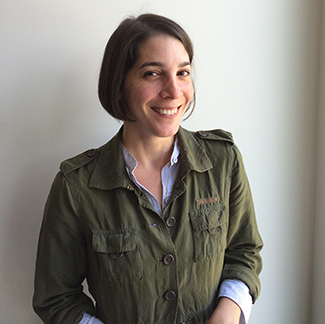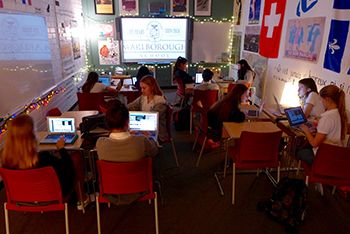
Elizabeth Vitanza
Elizabeth Vitanza teaches her students a multitude of skills, including French, video editing and project management, when she does her IWitness unit each year.
Vitanza teaches French at Marlborough School in Los Angeles. She was actually a college roommate of Amy M. Carnes, USC Shoah Foundation associate director of education – evaluation and scholarship, who suggested in 2010 that Vitanza participate in the Institute’s Master Teacher workshop. These workshops introduced teachers to the pedagogy and methods of teaching with testimony. Vitanza said it was one of the best professional development programs she’s ever done.
“It was real teachers telling us what worked and what didn’t, and we had time to develop lessons,” Vitanza said. “It was 10-hour days just working with testimony.”
For the past three years, Vitanza has used IWitness in her eighth and 12th grade classes. She does a testimony-based lesson with her 12th graders about French identity during the German occupation of World War II, in which they watch French language testimony of survivors and aid workers. They discuss how their identities changed in order to survive, and how hey saw themselves in comparison to how others saw them.

“Watching them manage the project, it’s empowering for them. They realize ‘I can do this,’” Vitanza said. “It’s great to see what they’re able to do when they’re given the space.”
Vitanza said she is learning along with her students, and continues to refine the assignment to better help her students succeed. She gives students more context about the 1930s and ‘40s in France through films, written French testimonies, and lessons about World War II history. This year, she said the videos are some of the best she’s seen.
“These students are realizing that resistance takes many forms, they are learning how to manage a project and tell a coherent story in respectful and honest way, and they are realizing that to do good work requires serious effort,” Vitanza said. “What I like with IWitness is that I can provide so much immediate feedback and that there are no shortcuts.”
As a French teacher, Vitanza said she is fascinated by the ways in which testimonies reveal French culture and identity before, during and after the war. It makes French history come alive, and “every single one is interesting,” she said. Equally important is how IWitness combines creativity and technology to yield such a significant learning experience for students.
“It’s the only thing I’ve found that does that in a meangful way,” Vitanza said.